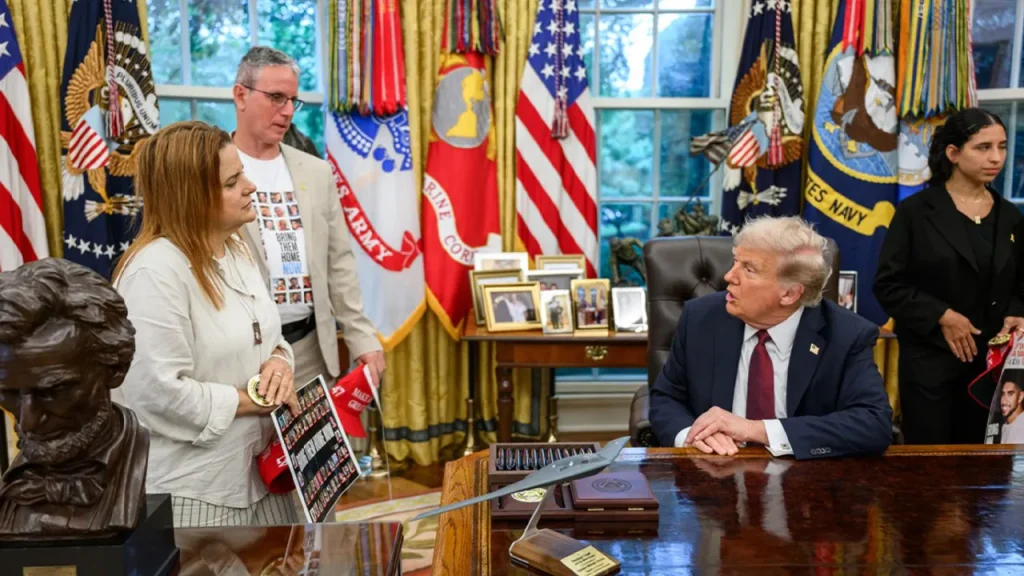Trump Acknowledged by Hostages’ Families on Oct. 7 Anniversary
As the world marks two years since the devastating October 7 attacks, President Donald Trump received a heartfelt letter of appreciation from the Hostages and Missing Families Forum. These families, who have endured unimaginable suffering while awaiting news of loved ones captured during the Hamas attacks, expressed their gratitude for Trump’s unwavering commitment to securing the hostages’ release. Their letter to the Norwegian Nobel Committee highlighted Trump’s peace efforts, which they believe have created a turning point in their long ordeal. The President responded with his own letter, reaffirming his dedication to bringing every hostage home and ensuring Hamas can never again perpetrate such violence.
Trump’s letter expressed profound empathy for the families’ suffering, acknowledging the horror of the October 7 attacks when “families were ripped apart, children torn from their parents’ arms, and innocent people shot, killed, and raped.” He commended the families for their resilience in continuing to advocate for their loved ones despite their own pain. The President’s response reflects the human dimension of this conflict—behind the geopolitical negotiations and military strategies are real families experiencing profound grief and uncertainty. The exchange of letters represents a rare moment of connection between those in power and those most directly affected by the violence.
The Hostages and Missing Families Forum’s letter to the Nobel Committee was particularly striking in its praise for Trump’s peace efforts. “President Trump’s determination to bring peace made possible what many said was impossible. From the moment of his inauguration, he brought us light through our darkest times,” they wrote. The families acknowledged the tangible results of Trump’s efforts—several hostages have been released since his inauguration, giving some families reunion with their loved ones and others “the dignity of burial and closure.” Their endorsement carries significant moral weight, coming from those who have the most personal stake in resolving the conflict.
Recent diplomatic developments suggest momentum behind Trump’s peace plan. Israeli Prime Minister Benjamin Netanyahu accepted the 20-point plan during his visit to the United States last month. While Hamas expressed readiness to release hostages, they stopped short of fully endorsing the plan. Nevertheless, chief negotiators from both sides met in Egypt on Tuesday to continue discussions. An Egyptian official familiar with these talks revealed that Hamas and Israel have reached agreement on most first-phase terms, including the crucial components of hostage release and ceasefire establishment. Secretary of State Marco Rubio characterized the plan as “a historic opportunity to close this dark chapter, and to build a foundation for lasting peace and security for all.”
Trump’s recent public statements have shown his ongoing commitment to advancing the peace process. Over the weekend, he urged negotiators to “move fast,” interpreting Hamas’ response as generally positive. In a significant diplomatic move, he called on Israel to “immediately stop the bombing of Gaza,” suggesting a shift toward prioritizing civilian protection and humanitarian concerns. This call for restraint, coming from a president typically viewed as strongly pro-Israel, indicates the delicate balancing act required to move the peace process forward while maintaining relationships with key allies in the region.
The Nobel Peace Prize nomination by the hostage families represents their profound appreciation for Trump’s efforts, though it remains uncertain whether he will receive the honor. Regardless of the Nobel Committee’s decision, the President appears determined to pursue peace and end the devastating conflict that has claimed thousands of lives. Trump recently announced that Israel has agreed to an “initial withdrawal line” in Gaza, describing the conflict as approaching the end of a “3,000-year catastrophe.” The focus now shifts to implementation—whether the diplomatic framework can translate into lasting peace for a region that has known generations of violence, and whether families separated by the horrors of October 7 can finally be reunited or find closure after two years of agonizing uncertainty.


